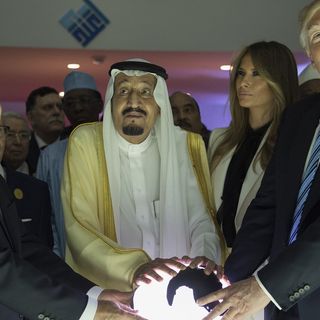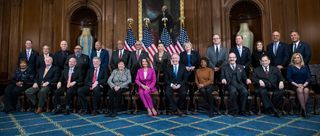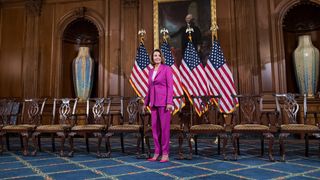Key takeaways
- The border wall-shutdown chaos, married with Washington’s longstanding hyper-partisanship, does not bode well for the next two years in terms of a unified Congress.
- The Trump cabinet and senior officials are about to experience something they avoided in their first two years: critical — and often extremely hostile — examination under oath about what they do, why they do it, and who told them to do it.
- While Australia’s interests will be affected by the work of the all-powerful Ways and Means Committee as it examines Trump’s trade deals — especially with China — it is the activity in the Foreign Affairs Committee that will be directly pertinent to the conduct of US foreign policy overall.
- The legislative and oversight agenda of committees will be designed to help shape the contours of the 2020 presidential campaign and show the American people what the country would look like under a Democratic president and Congress.
Introduction
The House of Representatives of the 116th Congress duly convened at 12 noon on January 3, 2019, as prescribed by the 20th Amendment to the Constitution. Immediately following the ceremonies — the swearing in of the 438 members-elect and the election of Nancy Pelosi as Speaker — the House was immediately engulfed in the political fight over the partial shutdown of the federal government and whether to fund the wall on the Mexico border proposed by President Donald Trump. In their face-to-face meeting in the White House Situation Room on January 9, Speaker Pelosi rejected President Trump’s insistence on funding for the wall and Trump said “bye-bye”.1 The negotiations collapsed. The shutdown is now the longest in US history.
The country is now more divided politically than at any time since the Vietnam War. Both the president and the Democrats attribute their success to their very high standing with their respective bases — and those bases do not want to yield to each other.
Divided government in Washington is never easy. To get anything done, especially in sessions of Congress proximate to a presidential election, it requires a degree of adroit political management. This is possible: major tax reform was passed in 1986 under Ronald Reagan, with Democrats controlling the House; budget and tax deals to address the recession were enacted under President Bush in 1990 and 1991 — under Democratic-controlled Congresses — and President Clinton delivered balanced budgets in 1999-2000, when the Republicans controlled both the House and Senate.
This president, for all his boasting of his great deal-making abilities, has so far failed to master the art of deal-making in Washington. It is a world he is neither from nor understands. While many of his supporters laud his forcefulness as a great disruptor, the fact is that, aside from criminal justice reform, all the major legislation Trump has seen enacted into law — particularly the tax cuts of 2017 — were passed solely with Republican votes. Trump never brokered a deal to repeal Obamacare, nor a deal for a major infrastructure program, nor a deal on immigration reform and protecting the ‘Dreamers’.2
This wall-shutdown chaos, married with Washington’s longstanding hyper-partisanship, does not bode well for the next two years in terms of Congress and the White House coming together to act in a unified fashion in the national interest. The country is now more divided politically than at any time since the Vietnam War. Both the president and the Democrats attribute their success to their very high standing with their respective bases — and those bases do not want to yield to each other. The ultimate political question as we head into the 2020 presidential election cycle is: which base is larger (and expanding), and which will prevail in the race for the White House and control of the House and Senate.
A return to Speaker Pelosi
Nancy Pelosi has reprised her role as Speaker of the House of Representatives. As Speaker in the first two years of President Barack Obama’s first term (2009-2010), she showed both her political management over her caucus and her work with the committee chairs to advance the president’s legislative agenda.
Speaker Nancy Pelosi will remain decidedly unpopular on the national radar, and decidedly effective in running the House.
In that Congress, the Democrats were truly a mosaic of interests, with a strong liberal base joined together with more than three dozen “Blue Dogs” — members from moderate Republican districts. Pelosi was able to understand the forces and concerns driving her members, and then massage and assuage the ranks until she could produce a consensus with the requisite votes to pass legislation on the floor. That legislation was of course Obama’s legislative program: saving the economy during the Great Recession, enacting healthcare reform, advancing energy and climate legislation to address global warming, requiring new controls on the banks, and introducing new regulatory reforms to advance a progressive agenda that spanned everything from consumer to environmental protection.
In that period, Nancy Pelosi emerged as a grandmaster of the House despite becoming a huge and inviting target for conservatives for being too far left, too radical, too old, and too out of touch with mainstream America. Republicans campaigned hard against Pelosi’s becoming Speaker that year — but they still lost 40 seats and their majority.3 Pelosi will remain decidedly unpopular on the national radar, and decidedly effective in running the House.
New agendas
There are two over-arching agendas that will guide the work of the House over the next two years.
First is to conduct oversight of the Executive Branch. This is not only inherent in Congress’ responsibilities under Article I of the Constitution, but essential to undertake after two years of virtually non-existent review by the Republicans in the House (and the Senate) of the cabinet departments and executive agencies.4 The elephant on the oversight agenda, of course, is finding out whether there was a conspiracy among the Trump election campaign and business organisations, together with the Russians, to corrupt the 2016 presidential election — which would constitute a crime.5
American foreign policy after the midterms

There is also the question as to whether the president and/or his aides and associates engaged in acts constituting obstruction of justice by attempting to impede the assessment of these issues by Special Counsel Robert Mueller. It is entirely possible — indeed likely — that Mueller’s report, when it is issued, will lead the House Judiciary Committee to hold hearings on Mueller’s findings, as well as matters such as whether the president benefited financially from the business operations of the Trump Organization during his time in office. These are all part of their process of determining whether articles of impeachment should be issued against the president.
Second is to pass through the House — with no expectation of enactment into law given Republican control of the Senate and Trump in the White House — a Democratic agenda that will frame the 2020 presidential campaign, regardless of who is the Democratic nominee for president.
Therefore, we will see landmark oversight hearings — the first blockbuster featuring former Trump attorney Michael Cohen before the House Oversight and Investigations Committee on February 7. We will also likely see passage of major legislation through the House over the next two years to promote the delivery of universal healthcare reform, income security, education, immigration reform (including security for the ‘Dreamers’), environmental protection, trade policy, and loophole-closing tax reform to address excesses in the tax cuts passed in 2017, among others. Almost all of these bills will be dead on arrival in the Senate, with the poorest prospects of ever reaching the president’s desk.

Committees to watch
There are 16 major committees in the House, and other panels that will be established by the Democrats. Here are the big committees to watch, and what their agenda will be:
Committee on Ways and Means
Ways and Means has jurisdiction over trade and taxes. Chairman Richard Neal (Democrat — Massachusetts) has been in Congress 30 years. Two major issues are front and centre: review of trade agreements — including the US-Mexico-Canada (USMCA) trade deal concluded in 2018 by Trump as well as any trade-war-ending agreements reached with China and the European Union. While USMCA will be vetted in particular with respect to labour and environmental issues, Chinese deals will be vetted for details on currency manipulation, access to markets, IP protection, cybersecurity and related issues, and tariff equity. Indeed, these issues have generally enjoyed bipartisan support from lawmakers — strengthening Trump’s hand in the China negotiations. The committee will also assess the 2017 tax cuts and adjustments needed to make them more equitable from the Democrats’ point of view.
Committee on Energy and Commerce
Energy and Commerce has jurisdiction over healthcare, energy, the environment, telecommunications and consumer protection — the broadest jurisdiction on domestic policy issues in the House. Protecting the Affordable Care Act (Obamacare) is its first priority, particularly with respect to affordability, universal access to quality healthcare and ensuring coverage for those with pre-existing conditions. The committee will also engage in tough oversight of the Environmental Protection Agency and its wholesale repeal of regulations designed to curb global warming. Chairman Frank Pallone (Democrat — New Jersey) has served 30 years in Congress.
Permanent Select Committee on Intelligence
The Permanent Select Committee on Intelligence is chaired by Adam Schiff (Democrat — California), who has served 18 years in Congress. He is seen as a potential future Speaker of the House by virtue of his aggressive posture over the past two years on getting to the truth about Russian interference in the 2016 election. The committee will dig deep into the intelligence agencies and their vigilance over Russian and other foreign activity designed to target and upset American politics. It will pay particular attention to what Robert Mueller will report on these issues and recommending actions to safeguard the 2020 elections.
Committee on Foreign Affairs
The Committee on Foreign Affairs, responsible for legislation affecting the State Department and US foreign policy, and related agencies, is chaired by Eliot Engel (Democrat — New York), a 30-year veteran of the House. The committee will pursue a broad mandate that examines the consequences of Trump’s “America First” policies and their implications for US leadership of the West and its longstanding alliances across Europe and Asia. Engel has also said he will shift emphasis from counter-terrorism to investigating Trump’s activities. The committee will drill into the running of the State Department under Secretary Pompeo. It will test the withdrawal from Syria and what it means for the Middle East. It will also look at the US-Saudi relationship, and what should be done in the wake of the murder of journalist Jamal Khashoggi that was authorised at the highest levels of the Saudi kingdom.
Engel also wants to look at the issue of war powers, specifically when and under what conditions the use of force by the United States should occur — something that has been only episodically considered since 9/11 and the invasions of Afghanistan and Iraq. Wherever Trump is engaged in diplomacy — from summits with Putin6 to Kim Jong Un of North Korea to President Xi of China — Engel will want his committee to know what happened, what was committed to, and why.
What is examined will present Australia with a test of consonance of US foreign policy values and practices under Trump with Australia’s national interest priorities and strategic objectives.
While Australia’s interests will be affected by the work of the Ways and Means Committee as it examines Trump’s trade deals — especially with China — it is the activity in Foreign Affairs that will be directly pertinent to the conduct of US foreign policy overall: Trump’s posture to China, the nuclear negotiations with North Korea, the future of NATO and US ties to traditional European allies, policy in the Middle East, and US staying power in the Asia-Pacific. In each area, what is examined will present Australia with a test of consonance of US foreign policy values and practices under Trump with Australia’s national interest priorities and strategic objectives.
What Australians see and hear coming out of those committee rooms on those issues will spark debate about what it means for Australia’s foreign policy under US leadership during the Trump era.
Committee on the Judiciary
The Committee on the Judiciary will be front and centre on all the legal issues surrounding this administration, and is where potential presidential impeachment proceedings would commence. The committee is chaired by Jerry Nadler (Democrat — New York), a 36-year veteran. Nadler knows impeachment proceedings well, as he was on the Judiciary Committee when Bill Clinton was impeached in 1999. That was a searing experience for the nation, and it means that Nadler understands the difference between an impeachment warranted by true “high crimes and misdemeanors” as cited in the Constitution7 versus an impeachment warranted much more by the politics of partisan destruction.
The committee examines the workings and management of the Department of Justice. In particular, it will look at the policies and outlook of Attorney General nominee William Barr, and whether he will permit Mueller to complete his probe without interference and make the report public. The protection of the Mueller investigation will be the first order of business for the committee.
Committee on Oversight and Reform
The Committee on Oversight and Reform is the true watchdog for the House on the Executive Branch. Chairman Elijah Cummings (Democrat – Maryland) has served in Congress since 1996. He cut his teeth on oversight working closely with Henry Waxman, who chaired the committee when the Democrats re-took the House in 2006, and launched a forensic examination of Bush administration policies — from the conduct of the war in Iraq and the role and activities of Vice President Dick Cheney, to the activities of EPA and Wall Street financial institutions leading to the Great Recession.
While other committees have jurisdiction over the Trump administration in the context of the Mueller probe and the conduct and integrity of Trump appointees, it is this committee which is best placed to examine the issues surrounding the overall conduct of cabinet officers, the White House, and the Trump Organization as it intersected with the 2016 campaign and its business interests as pursued while Trump is president.
Other committees to watch
In addition to the headline news generated by these panels, several other major committees in the House — Appropriations, which controls government funding (supply); Armed Services, which addresses the defence forces, their funding and macro-policy settings; and Homeland Security, responsible for immigration and terrorism — will take actions that will resonate in Canberra, and have consequences for Australia’s defence and intelligence outlook.
Dangers for the Trump administration, opportunities for Democrats
These congressional committees will conduct their work aggressively. Indeed, on any day where a major scandal appears on the front page of a major newspaper, a letter from the relevant committee to the official and agency demanding explanations at a public hearing will be issued within hours. And subpoenas will follow if necessary.
On any day where a major scandal appears on the front page of a major newspaper, a letter from the relevant committee to the official and agency demanding explanations at a public hearing will be issued within hours. And subpoenas will follow if necessary.
The Trump cabinet and senior officials will therefore experience something they never faced in the first two years: critical — and often extremely hostile — examination under oath about what they do, why they do it, and who told them to do it. It will not be pleasant or comfortable and they will not be in control of the committee hearings where they will testify. The chairs of these committees all know how to generate maximum press exposure. Trump may well label it “fake news”, but the fact is that cabinet secretaries sweating the tough questions will be a novelty for them that most will likely not wear well, especially on television. It will also distract the members of the cabinet, senior officials and their staffs from their day-to-day responsibilities.
It is the deep experience of the chairs that is particularly notable. They have been in office for decades under Republican and Democratic presidents. They understand the role of their committees and the duty they have to craft legislation and conduct oversight. They also know the rules and the limits of appropriate activity by their panels.
All of the legislative and oversight agenda — aside from putting forward a policy platform and conducting necessary reviews of how the government is being run by the Trump administration — will be designed to help shape the contours of the 2020 presidential campaign. While the intent of the Democratic leaders is to pass good law and make government more accountable, it will also be designed to show the American people what the country would look like under a Democratic president and Congress.
There will be titanic battles, as evidenced by the fight over the wall and the government shutdown. That is but a prelude, an overture, to what is coming soon to a majority of congressional hearing rooms.






